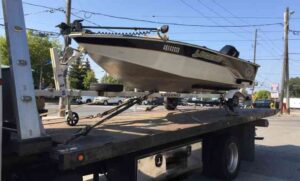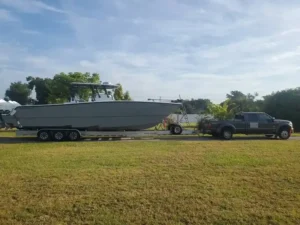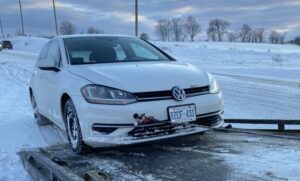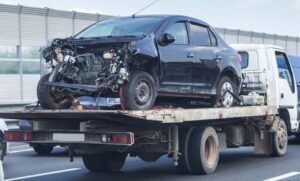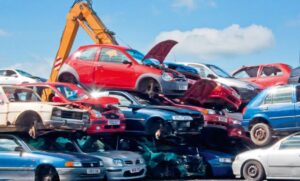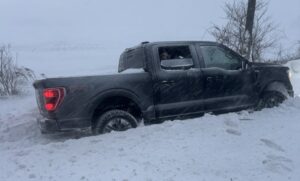Uxbridge, nestled in the heart of Ontario’s beautiful countryside, is a haven for outdoor enthusiasts. Its proximity to numerous lakes and waterways makes it a popular destination for boating, fishing, and watersports. From the tranquil waters of local ponds and smaller lakes to the broader expanse of Lake Simcoe within easy reach, boat owners in Uxbridge and the surrounding areas frequently require reliable and safe Boat and trailers towing Uxbridge services. Whether you’re heading out for a weekend on the water, transporting a new purchase, or moving your vessel for storage, the complexities of towing a boat demand expertise, the right equipment, and an unwavering commitment to safety.
At Pars Towing, a trusted name in towing services across Ontario and with a strong presence in the Aurora area, we understand that boat owners have unique needs. Our comprehensive heavy-duty towing capabilities extend far beyond standard vehicle recovery; we are fully equipped to handle the specialized requirements of boat and trailer towing in Uxbridge. This article will delve into the intricacies of transporting boats, the critical factors involved, and how Pars Towing stands as your premier partner for ensuring your vessel arrives at its destination safely and efficiently.
- Learn More >>>>Boat and trailers towing scugog
Expert Boat and Trailer Towing in Uxbridge by Pars Towing
The Joys and Challenges of Boating in Uxbridge
Uxbridge’s charm lies in its connection to nature. While not directly on a major body of water, its strategic location provides convenient access to various boating opportunities. Local streams and smaller lakes offer serene spots for canoeing, kayaking, and smaller recreational boats. For larger vessels and more expansive adventures, Lake Simcoe is a short drive away, presenting endless possibilities for sailing, powerboating, and fishing.
However, the enjoyment of boating often comes with the practical challenge of transporting your vessel. Boats, regardless of size, are substantial investments, and their trailers, while designed for transport, add another layer of complexity. Improper towing can lead to serious accidents, damage to your boat or vehicle, and costly fines. This is where professional boat and trailer towing services become indispensable.
- Learn More >>>>Boat and trailers towing Whitby
Understanding the Nuances of Boat and Trailer Towing
Towing a boat is significantly different from towing a car or even a small utility trailer. Several critical factors must be meticulously managed to ensure a safe and compliant journey.
1. Weight and Dimensions: The Foundation of Safe Towing
The combined weight of a boat and its trailer can be substantial. Even a small fishing boat with its trailer can exceed the towing capacity of many standard vehicles, while larger recreational boats can weigh several tons. This necessitates:
- Matching Tow Vehicle to Load: The tow vehicle must have a sufficient Gross Vehicle Weight Rating (GVWR) and Gross Combination Weight Rating (GCWR) to safely handle the boat and trailer’s weight. Overloading a vehicle is illegal and extremely dangerous.
- Trailer Capacity: Every boat trailer has a Gross Vehicle Weight Rating (GVWR) stamped on it, indicating the maximum weight it can safely carry, including the boat, engine, fuel, and all gear. It’s crucial that the boat’s “packaged weight” (boat + all contents) never exceeds this.
- Weight Distribution: Proper weight distribution on the trailer is paramount. The general rule of thumb is that 10-15% of the total trailer weight should be tongue weight (the weight pressing down on the hitch ball). Too little tongue weight can cause dangerous swaying (fishtailing), while too much can overload the tow vehicle’s rear axle.
- Learn More >>>>Boat and trailers towing Brock
2. Trailer Types and Their Specific Needs
Boat trailers come in various configurations, each with its own loading and towing characteristics:
- Bunk Trailers: Common for smaller boats, these trailers use carpeted wooden bunks to support the boat’s hull. They typically require deeper submersion at the launch ramp for easy loading and unloading.
- Roller Trailers: These trailers use a series of rollers to support the hull, making launching and retrieving easier, especially on shallower ramps or at low tide, as they don’t need to be submerged as deeply.
- Float-on Trailers: Often used for larger or heavier boats, these trailers are designed to be backed deep into the water, allowing the boat to literally float onto the bunks or rollers.
- Galvanized Steel vs. Aluminum: Trailer materials also vary, with galvanized steel offering strength and rust resistance (though not rust-proof), and aluminum being lighter and highly corrosion-resistant, ideal for saltwater environments.
Regardless of the trailer type, ensuring it’s properly sized for the boat and in excellent mechanical condition (tires, bearings, lights, brakes) is vital.
3. Critical Components: Hitches, Brakes, and Lights
- Hitch System: A high-quality trailer hitch, correctly installed and rated for the trailer’s gross weight, is non-negotiable. Safety chains or cables, crossed under the tongue, provide a crucial backup in case the primary hitch disconnects.
- Trailer Brakes: If a boat trailer has a Gross Trailer Weight (GTW) of 1,360 kg (2,998 lbs) or more in Ontario, it is legally required to have its own braking system. These can be surge brakes (hydraulic, activated by the trailer pushing on the hitch) or electric brakes (activated by a controller in the tow vehicle). Proper functionality of trailer brakes is crucial for safe stopping, especially with heavy loads.
- Lighting System: All trailers must have functioning tail lights, brake lights, turn signals, and side marker lights, as well as a licence plate light. These lights must be properly connected to the tow vehicle and checked before every trip.
- Tires: Trailer tires are distinct from vehicle tires. They are designed for heavier loads and should always be inflated to the maximum PSI indicated on the sidewall. Under-inflation is a leading cause of trailer tire blowouts.
4. Ontario Road Regulations and Permits
Towing in Ontario is governed by the Highway Traffic Act (HTA) and various regulations. For boat and trailer towing, key considerations include:
- Driver’s License: For trailer and load combinations exceeding 4,600 kg (10,141 lbs) of transmitted weight to the road, a Class A driver’s license (or a restricted Class A) is required. For lighter trailers, a Class G license is sufficient, provided the combination stays within specific weight limits and the trailer’s brakes are not air brakes.
- Registration and License Plate: All trailers, including boat trailers, must be registered with ServiceOntario and display a valid license plate.
- Oversize/Overweight Permits: If the boat and trailer combination exceeds standard width (2.6 metres), length (23 metres for vehicle and trailer), or height (4.15 metres), or standard weight limits, an Oversize/Overweight (O/O) permit from the MTO is required. This often comes with specific route restrictions, travel times, and potentially the need for escort vehicles.
- Annual Safety Inspections: Trailers (and trucks towing them) with a combined weight exceeding 4,500 kg (9,920 lbs) are subject to annual safety inspections.
- No Passengers: It is illegal to carry passengers in a towed boat or any trailer.
5. Navigating Launch Ramps and Terrain

Uxbridge and surrounding areas feature diverse terrain. Launching and retrieving a boat, especially a larger one, requires skill and careful planning:
- Ramp Conditions: Launch ramps can be steep, slippery, or crowded. Navigating them with a large boat and trailer requires precision and patience.
- Maneuvering: Backing up a trailer, particularly a long boat trailer, is a skill that takes practice. Tight turns, blind spots, and uneven surfaces can all pose challenges.
- Pre-Launch/Post-Retrieval Checklist: Proper preparation at the ramp is crucial: checking drain plugs, securing loose gear, detaching tie-downs (before launching), and re-securing everything (after retrieving).
- Learn More >>>>Boat and trailers towing clarington
Why Choose Pars Towing for Your Boat & Trailer in Uxbridge?
For residents and visitors in Uxbridge, relying on Pars Towing for boat and trailer transport offers unparalleled peace of mind and professionalism. Our services are designed to address every aspect of safe and compliant boat towing.
1. Expert Knowledge and Experience
Our team at Pars Towing possesses extensive experience in heavy-duty and specialized towing. We are intimately familiar with the nuances of boat and trailer dynamics, weight distribution, and securement techniques. Our operators are trained to handle various types and sizes of boats, from personal watercraft to larger cruisers.
2. Specialized Heavy-Duty Fleet
We operate a modern fleet of heavy-duty tow trucks and specialized trailers capable of safely transporting your boat. This includes:
- Powerful Tow Vehicles: Our trucks are specifically designed to handle significant towing capacities, ensuring stability and control even with heavy boat loads.
- Appropriate Trailer Connections: We utilize the correct hitch types and connections to ensure a secure link between our tow vehicle and your boat trailer.
- Comprehensive Safety Equipment: We carry all necessary safety chains, straps, and lighting equipment to comply with regulations and secure your boat effectively.
3. Strict Adherence to Ontario Regulations
Navigating the MTO’s regulations for towing boats and trailers can be complex. Pars Towing takes this burden off your shoulders:
- Licensing and Certification: All our drivers are fully licensed and certified for heavy-duty towing operations, including the specific requirements for commercial vehicle operator’s registration (CVOR) if applicable.
- Permit Assistance: We can assist you in determining if an Oversize/Overweight permit is required for your boat and trailer combination and guide you through the application process with the MTO, ensuring full compliance.
- Safety Compliance: We rigorously adhere to all safety standards, including proper lighting, braking, and load securement protocols.
4. Pre-Trip Inspections and Load Securement
Before every tow, our operators conduct thorough inspections:
- Vehicle and Trailer Check: We inspect our tow vehicle, your boat trailer’s tires, bearings, lights, and braking system.
- Boat Securement: We ensure the boat is properly centered on its bunks or rollers, and all tie-downs (bow and transom straps) are securely fastened. Loose gear within the boat is also checked to prevent it from blowing out during transit.
- Weight Distribution Verification: We confirm proper tongue weight to prevent dangerous swaying or instability on the road.
5. 24/7 Availability and Prompt Service
Boat towing needs can arise unexpectedly. Whether you’ve purchased a boat and need it delivered, are moving to a new area, or require emergency transport due to a trailer breakdown, Pars Towing is available 24 hours a day, 7 days a week. Our rapid response times minimize your wait and get your valuable asset on its way.
6. Safe and Efficient Transport to and from Uxbridge Waterways
While specific large public boat launches directly within Uxbridge might be limited, the surrounding area, including access points to Lake Simcoe (such as Port Whitby Marina which handles larger boats), means boat owners frequently need reliable transport. Pars Towing understands these geographical nuances. We can:
- Transport to and from local Uxbridge residences/storage.
- Deliver to and retrieve from nearby marinas and public boat launches.
- Provide long-distance towing for boats being moved across Ontario.
- Learn More >>>>Boat and trailers towing oshawa
Preparing Your Boat for Towing: A Collaborative Effort
While Pars Towing handles the professional towing, there are steps boat owners can take to ensure a smooth and safe process:
- Remove Loose Items: Secure or remove anything that could blow out of the boat during transit (cushions, covers, fishing gear, etc.).
- Drain Plugs: Ensure the boat’s drain plug is removed to allow any water to drain, reducing weight.
- Secure Covers: If using a boat cover, ensure it’s tightly secured to prevent flapping or tearing.
- Antennas/Tops: Lower any antennas, bimini tops, or other structures that might exceed height limits or be damaged during transport.
- Engine/Outdrive: Ensure your outboard motor or sterndrive is trimmed up and secured for road transport.
- Check Trailer Condition: Even if professional towing is used, a quick check of your trailer’s tires (inflation and condition) and lights (if accessible) is always a good idea.
- Learn More >>>>Boat and trailers towing Ajax
Beyond the Roadside: A Partner for Your Boating Lifestyle
At Pars Towing, we see ourselves as more than just a towing service; we are a partner in enabling your boating lifestyle in Uxbridge. We understand the investment and passion that goes into owning a boat, and we treat your vessel with the utmost care and respect. Our commitment to transparent pricing, clear communication, and exceptional customer service ensures a stress-free experience from start to finish.
Whether you’re a seasoned boater or a new enthusiast in Uxbridge, the journey to and from the water should be as enjoyable and safe as the time spent on it. Don’t take chances with unprofessional or ill-equipped towing services. For reliable, safe, and expert boat and trailer towing in Uxbridge, trust the proven capabilities of Pars Towing.

